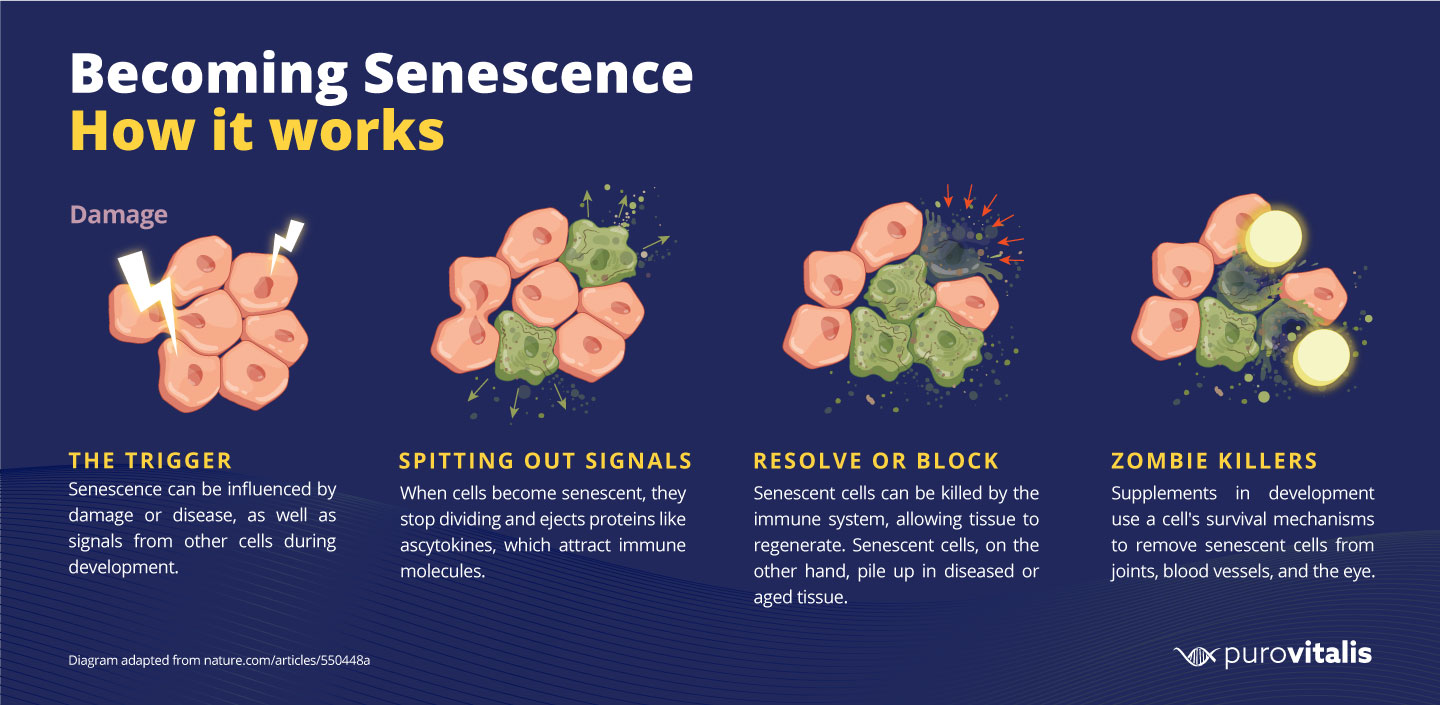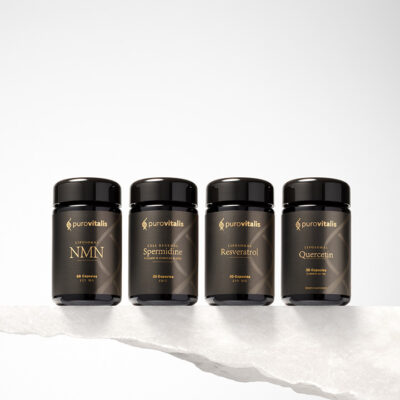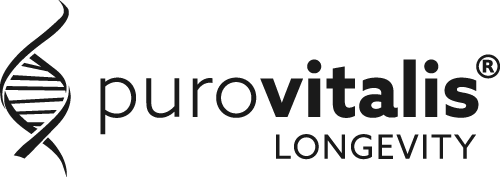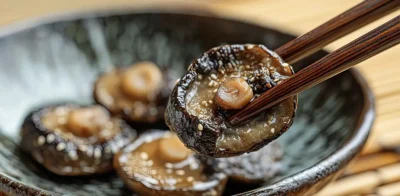
Quercetin er ved at blive et populært navn i verden af longevity og sundhedstilskud. Men hvad er det, og hvorfor er så mange mennesker interesserede i det? Denne guide gennemgår alt om quercetin med fokus på dets fordele for huden, hvor meget man skal tage, og hvilke bivirkninger det kan have.
Hvad er quercetin?
Quercetin er et naturligt forekommende flavonoid, en type plantepigment, der bidrager til farverne i mange frugter og grøntsager. Ud over sin rolle i planters sundhed har det mange fordele for menneskers sundhed. Det er en antioxidant, hvilket betyder, at det hjælper med at beskytte dine celler mod skader fra frie radikaler - ustabile molekyler, der kan skade cellestrukturer. Denne beskyttelse er en nøglefaktor i quercetins sundhedsmæssige fordele.
Forståelse af flavonoider
Flavonoider som quercetin hører til en bredere kategori af plantebaserede phytonæringsstoffer. De udmærker sig ved deres antioxidante og antiinflammatoriske egenskaber. I vores kroppe påvirker disse forbindelser aktivt forskellige metaboliske processer, hvilket forbedrer den generelle sundhed og velvære.
Naturlige kilder til quercetin
Quercetin findes i rigelige mængder i mange forskellige fødevarer, hvilket gør det nemt at indarbejde i din kost. Her er nogle af de bedste naturlige kilder:
- Æbler: Især i skrællen er æbler en lækker måde at få quercetin på.
- Bær: Blåbær, brombær og andre bær er rige på flavonoider.
- Vindruer: Både druer og vin, især røde sorter, indeholder quercetin.
- Løg: Denne almindelige madlavningsingrediens er en overraskende god kilde.
- Rødvin: I moderate mængder er rødvin en god måde at indtage flavonoider på.
- Grøn te: Grøn te er kendt for sine sundhedsmæssige fordele og er en anden fremragende kilde.
Hvis du inkluderer disse fødevarer i din kost, kan det øge dit indtag af quercetin og bidrage til de antioxidante fordele, de tilbyder.
Fordele ved quercetin
Quercetins sundhedsmæssige fordele er mangfoldige og virkningsfulde. En af dets mest berømte roller er at fremme hudens sundhed. Som antioxidant hjælper quercetin med at bekæmpe oxidativ stress, som kan føre til for tidlig aldring og hudskader. Denne virkning hjælper med at opretholde en ungdommelig, sund hud.
De vigtigste fordele ved quercetin:
- Fremmer hudens sundhed: Ved at bekæmpe frie radikaler kan quercetin reducere tegn på ældning og beskytte huden mod miljøskader.
- Reducerer inflammation: Det har antiinflammatoriske egenskaber, som gør det gavnligt i forhold til at reducere inflammation i forskellige dele af kroppen.
- Lindrer allergisymptomer: Det kan stabilisere mastceller, hvilket hjælper med at reducere allergiske reaktioner og symptomer.
Quercetins fordele for huden
Quercetins rolle i hudens sundhed tilskrives i høj grad dens antioxidantegenskaber, som giver beskyttelse mod miljømæssige stressfaktorer og aldring.
Bekæmpelse af frie radikaler
- Bekæmper oxidativ stress: Neutraliserer frie radikaler, som kan skade hudcellerne og føre til aldringstegn.
- UV-beskyttelse: Undersøgelser tyder på, at quercetin kan hjælpe med at beskytte huden mod de skadelige virkninger af UV-stråler og reducere risikoen for solskader.
Anti-age effekter
- Reducerer rynker og fine linjer: Ved at bekæmpe oxidativ stress kan quercetin mindske forekomsten af rynker og fine linjer.
- Forbedrer hudens elasticitet: Dens antioxidante virkning hjælper også med at bevare hudens elasticitet og holder den fast og ungdommelig.
Hudbetændelse og allergi
- Lindrer betændelse: Quercetins antiinflammatoriske egenskaber gør det effektivt til at berolige hudlidelser som eksem og rosacea.
- Lindring af allergiske reaktioner: Ved at stabilisere mastcellerne kan quercetin reducere allergiske reaktioner på huden, som f.eks. udslæt og nældefeber.
Quercetin kan reducere symptomer på allergi
Ifølge sundhedseksperter kan quercetins antiinflammatoriske egenskaber også hjælpe med at lindre allergisymptomer. Flere dyre- og reagensglasundersøgelser har vist, at quercetin kan reducere allergisymptomer ved at blokere histaminaktiviteten. Fordi dette kemikalie spiller en afgørende rolle i at fremme inflammation i menneskekroppen. En anden undersøgelse viste, at tilskud med quercetin kan reducere jordnødde-relaterede allergiske reaktioner hos mus betydeligt.
Videnskaben bag Quercetins fordele
Flere studier har undersøgt quercetins effekter på helbredet. For eksempel har forskning vist, at det har potentiale til at reducere risikoen for visse kroniske sygdomme som f.eks. hjertesygdomme. Dets antiinflammatoriske og antihistaminiske egenskaber gør det nyttigt til håndtering af allergier og astma.

Quercetin og senescente celler
Senescente celler er aldrende celler, der er holdt op med at dele sig. Med tiden kan deres ophobning bidrage til aldersrelaterede sygdomme og kronisk inflammation.
Målrettet mod senescente celler
- Reducerer aldring: Quercetin fungerer som et senolytisk middel. Det betyder, at det retter sig mod og hjælper med at fjerne aldrende celler, kendt som senescente celler, fra kroppen.
- Forebyggelse af aldersrelaterede sygdomme: Ved at reducere antallet af senescente celler kan quercetin hjælpe med at forebygge eller forsinke aldersrelaterede sygdomme og tilstande.
Forbedring af den cellulære sundhed
- Fremme af sund aldring: Fjernelse af senescente celler kan bidrage til en sundere aldring og reducere risikoen for forskellige aldersrelaterede sygdomme.
- Reducerer kronisk inflammation: Senescente celler er kendt for at udskille inflammatoriske faktorer. Quercetins senolytiske virkning kan hjælpe med at reducere denne inflammation.
Forskning og udvikling
Forskningen på dette område er i gang. For eksempel har en undersøgelse offentliggjort i "Aging Cell" fremhævet quercetins potentiale til at eliminere senescente celler og dermed hjælpe med at forebygge aldersrelateret funktionel tilbagegang.
Lær alt , hvad du har brug for at vide om "zombieceller" eller senescente celler her.
Dosering af quercetin
Effektiviteten og sikkerheden ved quercetin-tilskud afhænger i høj grad af den korrekte dosering, som kan variere afhængigt af individuelle behov og helbredstilstande.
Anbefalet dosisinterval
- Generel støtte til helbredet: Undersøgelser tyder på, at en dosis på 500-1000 mg om dagen er almindeligt anvendt til generelle sundhedsfordele, herunder antioxidantstøtte.
- Lindring af allergi: Ved allergi har doser på omkring 400-500 mg taget to gange dagligt vist sig at være effektive i nogle undersøgelser.
- Kardiovaskulær sundhed: Forskning viser, at 150-500 mg om dagen kan være gavnligt for hjertesundheden.
- Hudens sundhed: For at forbedre hudens sundhed og beskytte mod UV-skader anbefales ofte doser på mellem 500-1000 mg om dagen.
Faktorer, der påvirker doseringen
- Individuelle sundhedsbehov: Mål som at reducere inflammation eller håndtere allergier kan bestemme den nødvendige dosis.
- Alder og køn: Det kan være nødvendigt at justere doseringen for forskellige aldersgrupper og køn, hvilket afspejler deres unikke metaboliske og fysiologiske profiler.
- Specifikke sundhedstilstande: Tilstande som hjerte-kar-sygdomme eller inflammatoriske lidelser kan kræve skræddersyede doser for at opnå optimal effekt.
Videnskabelige referencer
- En undersøgelse i "European Journal of Clinical Nutrition" belyser quercetins farmakokinetik og viser, at optagelsen og omsætningen er dosisafhængig.
- Forskning i effekten af quercetin til lindring af allergi, som er offentliggjort i tidsskrifter som "Molecules", udforsker ofte doser på omkring 400-500 mg to gange dagligt.
- Undersøgelser af kardiovaskulære fordele, f.eks. i "Journal of Nutrition", har undersøgt virkningerne af quercetin i doser på 150-500 mg pr. dag.
- Når det gælder hudens sundhed, har forskning i dermatologiske publikationer som "Journal of Clinical and Aesthetic Dermatology" overvejet doser på op til 1000 mg dagligt.
Det er vigtigt at bemærke, at selv om disse doser er baseret på videnskabelig forskning, kan de individuelle behov variere. Det anbefales at konsultere en sundhedsudbyder for at bestemme den mest passende dosis baseret på personlige sundhedsbehov og -forhold.
Hvor lang tid tager det for Quercetin at virke?
Den tid, det tager at opleve fordelene ved quercetin, kan variere baseret på individuelle faktorer og det specifikke sundhedsproblem, der behandles.
Typisk tidslinje for effekter
- Fordele på kort sigt: Nogle virkninger, som f.eks. lindring af allergi, kan mærkes inden for dage til uger efter, at man er begyndt at tage tilskud.
- Langsigtede sundhedsforbedringer: Fordele som forbedret hudsundhed eller reduceret inflammation kan tage længere tid, ofte flere uger til måneder.
Hvornår skal man tage quercetin?
Tidspunktet for tilskud med quercetin kan påvirke dets effektivitet.
Bedste tidspunkter for forbrug
- Sammen med måltider: Hvis man tager quercetin sammen med mad, især den, der indeholder fedt, kan det øge optagelsen.
- Konsekvent daglig indtagelse: Regelmæssig indtagelse er afgørende for vedvarende fordele. Morgen- eller aftenrutiner kan etableres baseret på personlig bekvemmelighed og fordøjelseskomfort.
Quercetin Bivirkninger
De fleste mennesker tåler quercetin godt. Men som alle kosttilskud kan det give bivirkninger hos nogle personer.
Potentielle bivirkninger
- Hovedpine: Især ved højere doser.
- Kvalme: Dette kan forekomme, hvis quercetin tages på tom mave.
- Prikkende fornemmelser: Sjældent, men muligt, især ved høje doser eller langvarig brug.
Læs vores udvidede artikel om Quercetin og skjoldbruskkirtlen.
Er quercetin sikkert?
For de fleste mennesker er quercetin sikkert, når det indtages i fødevaremængder eller tages som tilskud i anbefalede doser.
Anbefalinger til sikker brug
- Rådfør dig med en sundhedsperson: Før du begynder, især hvis du har eksisterende helbredsproblemer eller tager anden medicin.
- Følg de anbefalede doser: Overskridelse af den anbefalede dosis kan øge risikoen for bivirkninger.
Biotilgængelighed af quercetin
Quercetins effektivitet afhænger af dets biotilgængelighed. Dette udtryk henviser til, hvor meget quercetin kroppen kan absorbere og bruge. Jo bedre biotilgængelighed, jo mere effektivt vil quercetin være.
Forståelse af biotilgængelighed
- Lav biotilgængelighed: Quercetin optages ikke godt i vores kroppe. Det sker, fordi det opløses dårligt, og kroppen nedbryder det hurtigt.
- Forbedring af absorptionen: Den form, som quercetin indtages i, kan påvirke optagelseshastigheden betydeligt.
Forskellige former
- Kapsler: Kombineres ofte med andre stoffer for at øge optagelsen.
- Pulver: Kan blandes med væsker; absorptionen kan variere afhængigt af den specifikke formulering.
- Rige fødevarer: Naturlige kilder kan give en bedre optagelse på grund af tilstedeværelsen af andre supplerende næringsstoffer.
- Liposomal form: Denne avancerede form indkapsler quercetin i et lipidlag, hvilket forbedrer opløseligheden og optagelsen.
Quercetin vs CoQ10
Coenzym Q10 (CoQ10) og Quercetin er begge stærke kosttilskud, men de tjener forskellige formål.
Quercetin
- Hudens sundhed: Fremragende til at bekæmpe oxidativ stress og inflammation i huden.
- Lindring af allergi og betændelse: Gavnlig ved håndtering af allergier og inflammatoriske tilstande.
CoQ10
- Øget energi: CoQ10 spiller en afgørende rolle i cellernes energiproduktion.
- Hjertesundhed: Kendt for at gavne hjertesundheden og mitokondriefunktionen.
Selv om begge kosttilskud har forskellige primære fordele, kan de supplere hinanden i en holistisk sundhedskur. Quercetins antiinflammatoriske og antioxidante egenskaber kombineret med CoQ10's energiforbedrende og hjertesundhedsmæssige fordele giver en omfattende tilgang til velvære.
Resveratrol med quercetin
Kombinationen af resveratrol og quercetin kan forbedre de sundhedsmæssige fordele ved hver af dem og give en synergistisk effekt.
Fordele ved antioxidanter
- Resveratrol: Resveratrol er kendt for sine anti-aging og hjertebeskyttende egenskaber og er en anden kraftig antioxidant. Den findes i druer, rødvin og bær og er kendt for sin evne til at aktivere veje i kroppen, der bidrager til longevity.
- Synergi med quercetin: Når resveratrol og quercetin kombineres, kan de give øget beskyttelse mod oxidativt stress. Denne synergi kan være særlig effektiv til at bekæmpe aldring, reducere inflammation og støtte hjerte-kar-sundhed.
Synergistiske effekter
- Komplementære handlinger: De to stoffer kan arbejde sammen om at forstærke hinandens virkninger. Mens quercetin stabiliserer mastceller, kan resveratrol f.eks. aktivere sirtuiner, en gruppe proteiner, der er forbundet med aldring og longevity.
- Bredere sundhedsmæssige virkninger: Kombinationen kan potentielt give bredere sundhedseffekter, såsom forbedret vaskulær sundhed, forbedret cellulær funktion og et stærkere forsvar mod aldersrelaterede sygdomme.
Du er måske også interesseret i fordelene ved quercertin og zink, når de kombineres.
Konklusion
Quercetin er et alsidigt og stærkt kosttilskud, som er særligt gavnligt for hudens sundhed og for at håndtere inflammation. Dets effektivitet kan påvirkes af dets form og biotilgængelighed. For dem, der er interesserede i at udforske fordelene ved quercetin, tilbyder Purovitalis en række kosttilskud, herunder innovative formuleringer, der er designet til at maksimere dets biotilgængelighed og effektivitet. Det er altid klogt at tale med en sundhedsfaglig person, før man begynder på et kosttilskud, herunder quercetin. De kan tilbyde personlig rådgivning, der er skræddersyet til dine behov.
Referencer
- Inflammation og immunitet: Denne undersøgelse diskuterer quercetins rolle i modulering af inflammation og immunfunktion.
- Quercetins kilder og bioaktiviteter: En oversigt over naturlige kilder til quercetin og dets forskellige sundhedsmæssige fordele.
- Kardiovaskulær sundhed:Denne forskning undersøger quercetins indvirkning på hjerte-kar-sundhed.
- Antioxidant og antiinflammatorisk aktivitet: Et omfattende kig på quercetins antioxidante og antiinflammatoriske egenskaber.
- Dosisafhængig farmakokinetik: Denne forskning hjælper os med at forstå de bedste måder at bruge quercetin effektivt på.
- UV-beskyttelse: Forskning i quercetins effektivitet til at beskytte huden mod UV-inducerede skader.
- Senolytisk middel: Undersøgelser fremhæver dets potentiale til at eliminere senescente celler og hjælpe med at forebygge aldersrelateret funktionel tilbagegang.
- Forbedring af biotilgængeligheden: Forskningsartikler om metoder til at øge biotilgængeligheden.
- https://pubmed.ncbi.nlm.nih.gov/28620474/
- https://pubmed.ncbi.nlm.nih.gov/18417116/
- https://pubmed.ncbi.nlm.nih.gov/23675073/
- https://pubmed.ncbi.nlm.nih.gov/18827577/
- https://pubmed.ncbi.nlm.nih.gov/23044824/
- https://pubmed.ncbi.nlm.nih.gov/27710596/
- https://pubmed.ncbi.nlm.nih.gov/27187333/
- https://www.spandidos-publications.com/or/33/6/2659
- https://pubmed.ncbi.nlm.nih.gov/27479153/
- https://pubmed.ncbi.nlm.nih.gov/11063442/
- https://pubmed.ncbi.nlm.nih.gov/29127724/

Spor 50+ sundhedsmålinger med AI-drevet nøjagtighed. Start din gratis prøveperiode i dag, og tag kontrol over din wellness-rejse!

Førsteklasses kosttilskud Liposomal teknologi fremstillet i EU Testet i tredjepartslaboratorium
Oplev livet fuldt ud, fordi du fortjener det bedste! Prøv Purovitalis kosttilskud!












